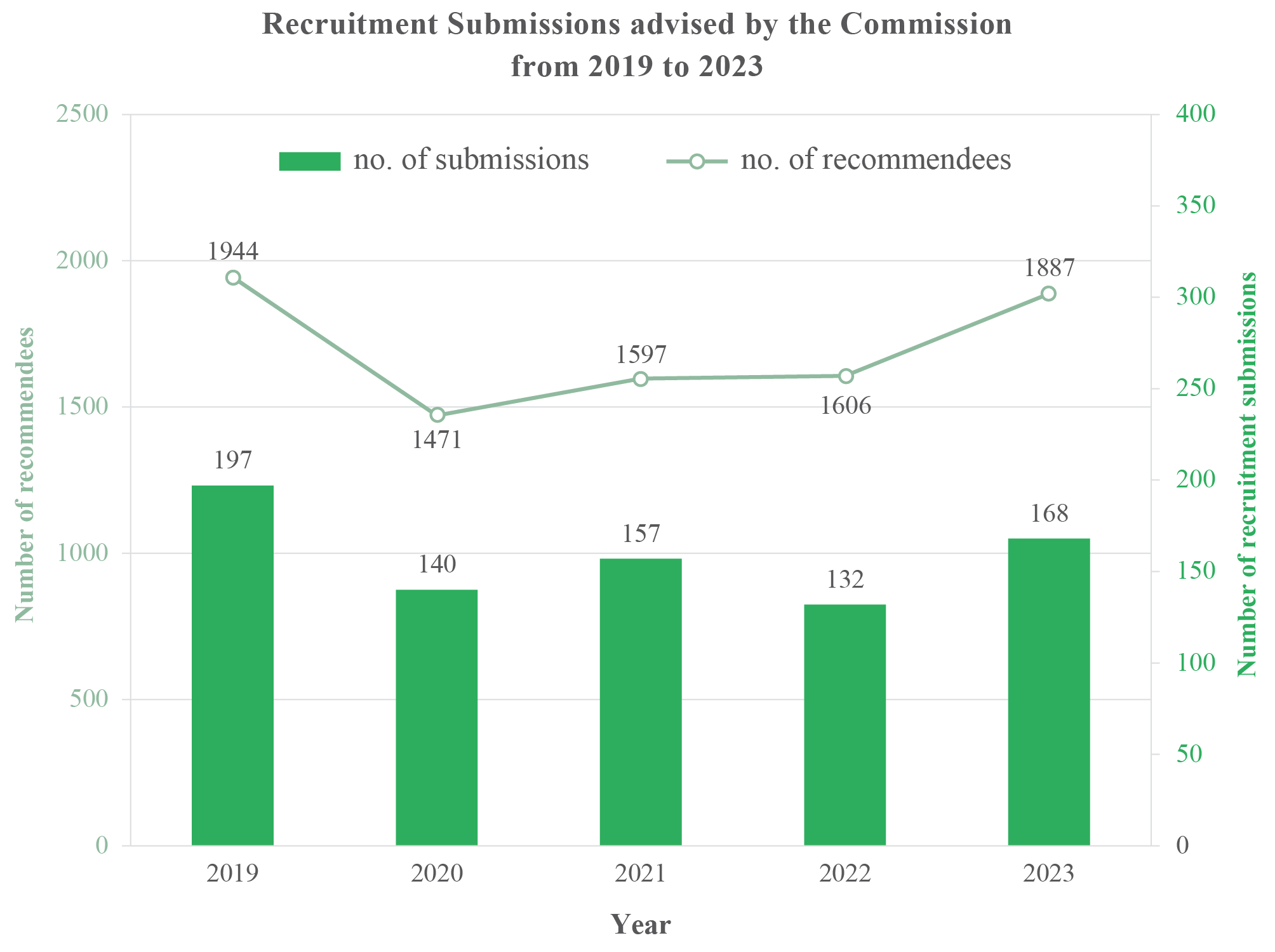Chapter 3
Chapter 3
Recruitment
3.1
Recruiting new talents and injecting new blood into the Civil Service is vital in sustaining a stable and robust workforce to achieve the aim of effective and efficient delivery of public service with high quality. B/Ds need to conduct regular recruitment exercises to meet their manpower requirements and service needs. The process of selection is rigorous and competition is keen. The Commission supports the conduct of recruitment based on merit and fair competition so as to select the best-suited candidates for the Civil Service jobs. Apart from ensuring the proper conduct of the recruitment process, we also attach importance to administrative efficiency in order that the Government can compete with the market for talents and good candidates.
Recruitment Submissions Advised in 2023
3.2
In 2023, the Commission advised on 168 recruitment submissions. With full resumption of normalcy from the COVID-19 epidemic, the Commission was pleased to note that B/Ds had been expediting the recruitment process in general, and recruitment exercises had been conducted in a largely smooth and effective manner. They had also adhered to Civil Service policies and rules in conducting the recruitment exercises, making appropriate preparations by planning and conducting recruitment exercises in advance of anticipated wastage. The number of recruitment submissions advised by the Commission in the past five years is shown below –

3.3
During the year, the Commission was also delighted to see the outstanding quality of board reports submitted by a number of Departments. In each of their submissions, the recruitment boards concerned had provided relevant information and cogent assessments on the performance of individual candidates, together with a clear and succinct account of the boards’ considerations. The Commission’s scrutiny of the recommendations was greatly facilitated and efficiency enhanced.
3.4
For some Departments, the quality of their boards’ write-ups on the interviewees remained wanting mainly in two areas –
(a)
the write-ups made by the boards were too brief and general which made it difficult for readers to differentiate the performance of the interviewees; and
(b)
the comments on individual candidates interviewed were highly similar or not clear enough to support the boards’ recommendations.
Although the ratings and scores given were clear and the results unaffected, the Commission has advised the relevant Departments to remind future recruitment boards to provide more specific comments in the written assessments to clearly reflect the performance of candidates so as to support the boards’ recommendations.
Expanding the Pool of Eligible Candidates in Recruitment to Undergraduate and Postgraduate Students in Penultimate Year of Study
3.5
The ability to recruit talents in the dynamic and competitive labour market is crucial for the Government to provide high quality public service. The Commission supports the Government to adopt a multi-pronged approach to attract more job seekers, in particular young people, to join the Civil Service. It is essential to cast a wider net in the trawl for top-notch young candidates.
3.6
With effect from 1 June 2023, B/Ds, having regard to their manpower resources and operational needs, are allowed to expand the pool of eligible candidates to undergraduate or postgraduate students in their penultimate year of study so that they may apply for Civil Service jobs requiring an undergraduate or a postgraduate qualification. Under this new arrangement, conditional advance offers will be made to successful penultimate year students, allowing them to join the Civil Service upon graduation, subject to their fulfilment of specified conditions, including the attainment of the required academic qualification within a stipulated period. Regardless of the year of intake of the selected candidates, recruiting B/Ds should assess all candidates equally.
3.7
The Commission fully supports this initiative, which does not only provide job security to those with aspirations to serve the community, but also enable young people to better plan their career path. More importantly, it facilitates B/Ds to secure high-performing candidates at an earlier stage.
Targeted Approach to Achieve Recruitment Targets
3.8
Despite resumption of normalcy, the Commission noted that a small number of Departments could not meet the recruitment targets in the past year. There are grades which face recruitment difficulty. Despite the efforts of the employing B/Ds to conduct recruitment exercises in a timely manner, they are still unable to recruit a sufficient number of suitable candidates to fill all vacancies over a prolonged period. It is neither desirable nor conducive to the smooth operation and succession of the Departments concerned.
3.9
Appreciating that various factors can affect the number of intakes, such as competitive labour market and shortage of skilled talents with the specific requirements of the jobs concerned, the Commission advocates that B/Ds should identify the contributing factors and develop effective measures to achieve their recruitment targets. In the past year, the Commission was pleased to see the proactive and flexible strategies adopted by three Departments to overcome their recruitment difficulties. Their cases are outlined below.
Case 3A
Seeing the room for adjusting the physical fitness test for recruitment, a Department, which has experienced recruitment difficulties, has revised the entry requirements for specified disciplined services grades to help attract a greater number of capable applicants. On the other hand, the GM concerned has not lost sight of the importance of upkeeping the physical fitness of new appointees by monitoring them closely and making necessary enhancement to the induction training so that they are physically fit to perform their operational duties.
Case 3B
Over the years, the public healthcare system in Hong Kong has encountered numerous challenges, with manpower shortage being a prominent issue. In order to ensure a stable and sufficient supply of medical professionals, the Government has introduced a new pathway for admission of qualified non-locally trained medical professionals to practise in Hong Kong. They can now apply for a new form of registration and work in local public healthcare institutions.To trawl a wider pool of candidates, a Department has allowed those eligible non-locally trained medical professionals who are permanent residents of Hong Kong to apply for Civil Service jobs. If selected and appointed, they would be offered the same terms and conditions as locally trained personnel.
Case 3C
Taking heed of the Commission’s advice, a Department, facing with the challenge of filling all vacancies for four consecutive years, had actively pursued targeted strategies to overcome its recruitment difficulty. Recognising that the limited number of eligible candidates in the market is due to the acquisition of certain post-qualification experience, the Department has made concerted efforts to build a greater pool of potential candidates. In addition to extending the cut-off date for counting the required experience to a later date, the Department has increased the training places for graduates, facilitating their acquisition of the necessary experience for qualifying in the field and providing them with a better understanding of the operation of the Government.
3.10
We appreciate the diligent efforts of the relevant Departments in addressing their persistent manpower concerns, while maintaining the professional standards, as well as upholding objectivity and impartiality in recruitment and appointment processes. In keeping with the Government’s endeavours to attract talents, HoGs/HoDs are encouraged to take bold steps in formulating their recruitment strategies.
Bureaux/Departments, which have been facing different degree of difficulties in achieving their recruitment targets, should consider adopting a forward-thinking approach to critically assess the prevailing circumstances and modify their recruitment strategies, where appropriate, to ensure a steady influx of talents.
